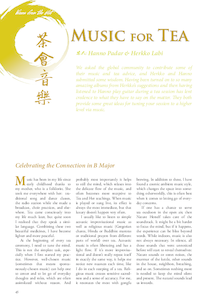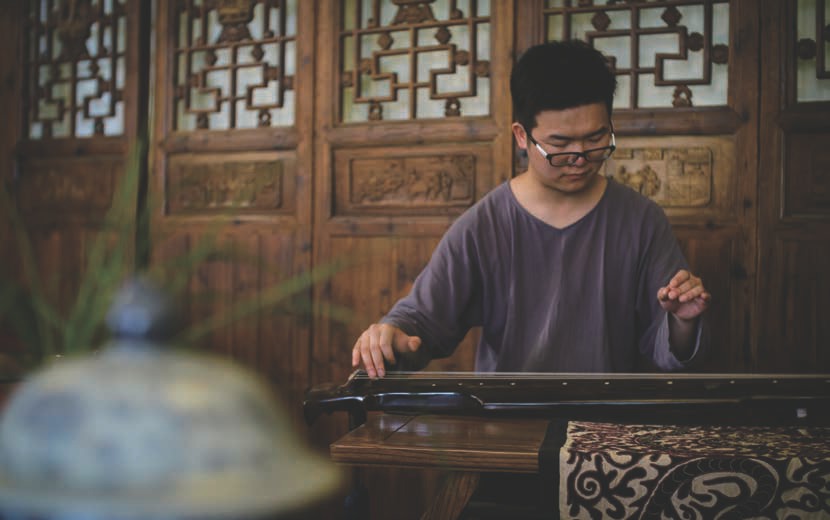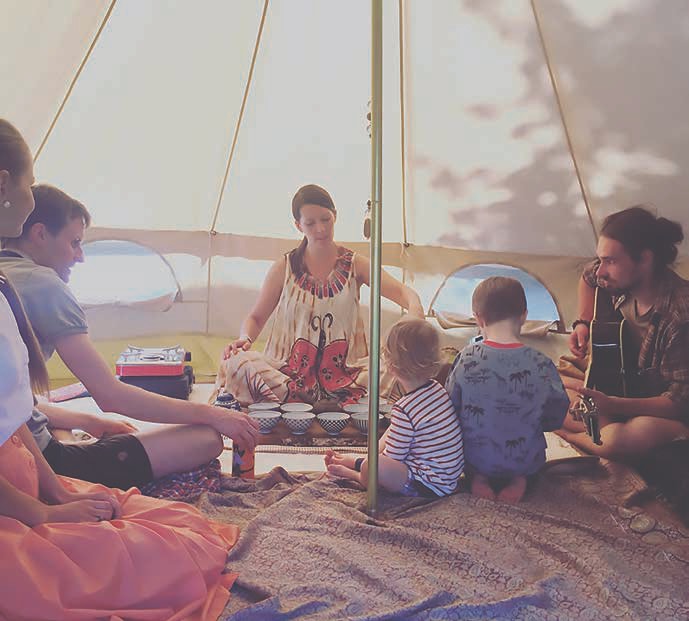
 |
|
We asked the global community to contribute some of their music and tea advice, and Herkko and Hanno submitted some wisdom. Having been turned on to so many amazing albums from Herkko's suggestions and then having listened to Hanno play guitar during a tea session has lent credence to what they have to say on the matter. They both provide some great ideas for tuning your session to a higher level via music.
Music has been in my life since early childhood thanks to my mother, who is a folklorist. She took me everywhere with her: traditional song and dance classes, the radio station while she made a broadcast, choir practices, and elsewhere. Tea came consciously into my life much later, but quite soon I realized that they speak a similar language. Combining these two beautiful medicines, I have become lighter and more peaceful.
At the beginning of every tea ceremony, I need to tune the mind. This is not the simplest task, especially when I first started my practice. However, well-chosen music (sometimes that means spontaneously-chosen music) can help one to center and to let go of everyday thoughts and roles, which are often assimilated without reason. And probably most importantly it helps to still the mind, which relaxes into the delicate flow of the music, and often becomes more receptive to Tea and Her teachings. When music is played or sung live, its effect is always the most immediate, but that luxury doesn't happen very often.
I usually like to listen to simple acoustic improvisational music as well as religious music (Gregorian chants, Hindu or Buddhist mantras or traditional prayers from different parts of world) over tea. Acoustic music is often liberating and has a light flow. If it's more improvisational and doesn't really repeat itself in exactly the same way, it helps me notice new nuances each time, like I do in each steeping of a tea. Religious music creates sensitive sacredness and a sense of accuracy. For me, it resonates the most with gongfu brewing. In addition to these, I have found a cosmic ambient music style, which changes the space into something otherworldly, this is often best when it comes to letting go of everyday concerns.
If one has a chance to serve tea outdoors in the open air, then Nature Herself takes care of the soundtrack. It might be a bit harder to focus the mind, but if it happens, the experience can be bliss beyond words. While indoors, music is also not always necessary. In silence, all those sounds that went unnoticed before will start to reveal themselves: Nature sounds or street noises, the murmur of the kettle, other sounds in the house, neighbors, breathing, and so on. Sometimes nothing more is needed to keep the mind silent and present. The natural sounds lead us inwards.

This relationship between music and Tea is not one-sided - Tea can also help to create music. The more time goes by, the more I find that tea helps the mind to be empty, without obstacles. It allows me to let go of thoughts and feelings which in ordinary situations might get stuck. This makes space for a huge potential for different kinds of creative activity, whether it be music, poetry, visual art, life situations, some form of relationship or anything else.
Like most situations in everyday life, creating music works better when one approaches it as a beginner. Music that emerges this way is purer, simpler and clearer, though it may be very complex in harmony or in its overall structure.
Composer and discoverer of Tintinnabuli style Arvo Pärt is an Estonian national treasure. He's also a gift to world culture, often considered the greatest living composer. In 2013, I attended a series of lectures about his music coordinated by professor Toomas Siitan at the University of Tartu, with Pärt in attendance. One of the biggest lessons, which surfaced repeatedly throughout the series, was that one needs to be empty in order to channel musical creativity. It means that a majority of the time during the creative process is spent in preparation and in maintaining a certain state of mind - a ready mind. He has even said, "Silence is the pause in me when I am near to God."
Arvo Pärt often finds his way to our sweet Chado teashop. His apartment is actually a small way down the same street. He gently removes his coat, and stays a while. He, too ,is a conscious, present tea drinker, and so we have a feeling that the Leaf is present in his creations as well. The specific manner in which this happens will hopefully become apparent in the future. And if not, we will also be happy to let it remain steeped in mystery.
What better music for a practitioner of the Way than silence. And with that, I could just finish writing and sit down for a nice cup of tea. What else is there to say? Even before turning on the heat under my kettle, I go to my stereo and put on my favorite tea drinking song at the moment: Vostok by Craig Padilla. Silence, yes! But tea with some harmonizing music - also a big YES! Can they work together? A bit of music and some grounding silence?
Vostok starts with cosmic synths, which slowly build up the central melody of this fifty-one-minutelong tribute to deep, comforting sound. I've noticed that when you first sit behind the pot and listen to the first few minutes of the music, you can instantly understand if a tea likes or dislikes the chosen track. It is strange that songs otherwise so relaxing and peaceful can have contrary effects on tea drinking. Why this is interests me very much. Why is Vostok good tea music while that of my favorite artist, Loscil, which is also really relaxing and deep, is not nice for tea?
Music in general is a play of frequencies that our mind can pick up and interpret accordingly. If you have drunk tea for some time now, you surely have noticed how your mind and your surrounding environment act together. When your mind calms and grounds, your surroundings also seem light, relaxed and at ease. This does not mean that you have some magical powers. It is just you tuning in to a state of being that reflects the world around you accordingly. Now, if you bring into this state of mind some music, it quickly starts to resonate (or not). I think this is why Tea is so sensitive to music - in opening up our senses and widening the specter of our minds, it also transforms our ability to listen. It is then more a feeling of music tuning into the state of being than a personal concept or choice of listening to a particular song. And if this feeling is in discordance, you instantly react and often change the music.
Being so sensitive to music, Tea is of course wisest when enjoyed in silence. How else would the ancient hermits have drunk their cups, if not to the sounds of birds, rain and the proverbial wind soughing the pines? Of course, traditional Chinese music has always been a counterpart to tea drinking. And if you listen to some of it while drinking tea, you quickly also understand why - it was often specially made for social occasions wherein tea played a central role. There was not such a wide distance between music and Tea. But most of our contemporary music is not created for Tea. This is why the tuning between them has to be taken with caution and requires a lot of experimenting before sharing the music with guests.
I like to compare choosing music for a tea session with storing tea in a jar or a room. If a jar has some strange smell, the tea stored in it will easily take this smell and you will never get rid of it. Wu De often teaches that if one puts a rose in the middle of a room filled with puerh, after some time the tea would all smell like roses. I see a similar delicate relationship between Tea and music. If you play the wrong songs in the middle of your tea session, the whole evening can be ruined. Okay, "ruined" may sound strong, but we must act wisely and experiment a lot before hosting a formal session, so the chosen music can give your evening that extra blessing it needs. But how to pick good tea music?
First of all, there is the question of personal taste. You can't choose a song that you really dislike. That's easy. You can try playing a song you don't really like, but think will go well with a tea, but your mind will give you a hard time for it. Second of all, you should sit quietly with the music and drink some tea at the same time. I've found that if at some point I forget the music is even playing and start focusing more on the tea, then the music is working with this tea. And if the music keeps coming back to my attention, something is not right. Maybe it's a synth that has been played too hard or a melody that is agitating me. Whatever the case, I'll know that this music is not suitable for this tea.
The music has to work every time you drink tea with it. Not just "this one time when everything was perfect." This is a rule. It may sound strange, as we all have our personal favorites and what we like, another may dislike. But with Tea, it seems a bit different: most music does not work with Tea. Most of your favorite artists won't suit Tea well. Try, and you'll find it to be true. But when a musical piece does flow into the tea and start to harmonize with its flow, such concert will recur every time you try again. Certain music resonates with certain teas, in other words. That insight is actually life-changing, and can begin a new era of exploration and experimentation.
From a more practical point of view, I recommend keeping the volume rather low; making a playlist and having a couple of back-up songs in case of some emergency; letting the kettle boil in silence and only starting the music after the first bowl or even later; being extra careful with music that has vocals, as lyrics easily distract the mind; and, finally, as always in this tradition: experiment a lot!
